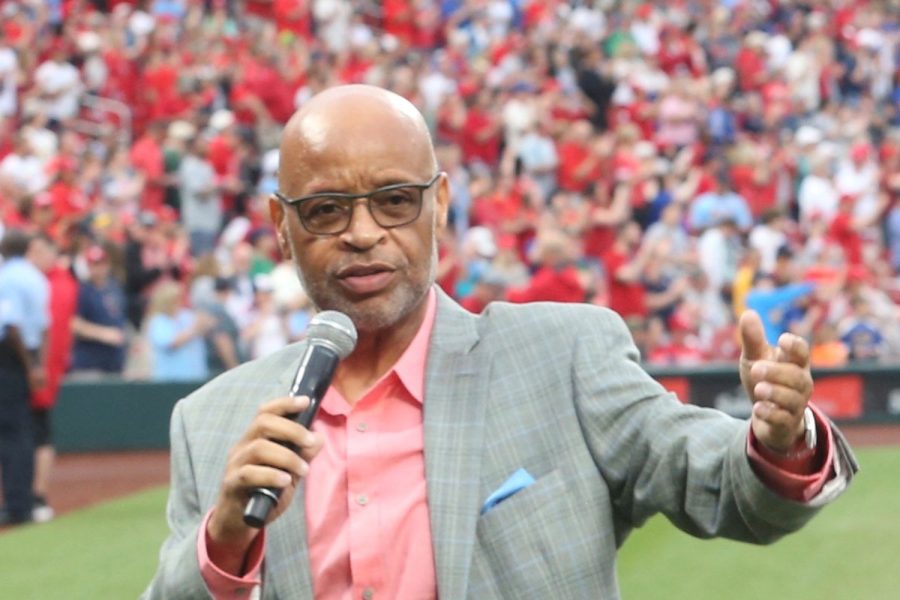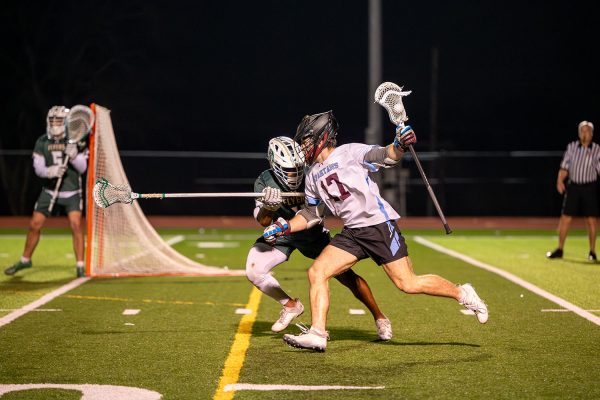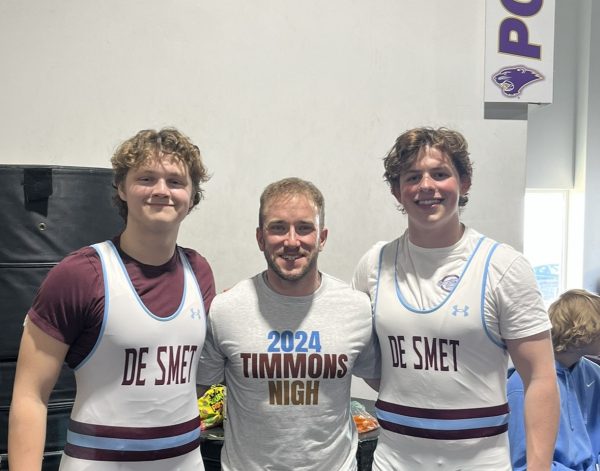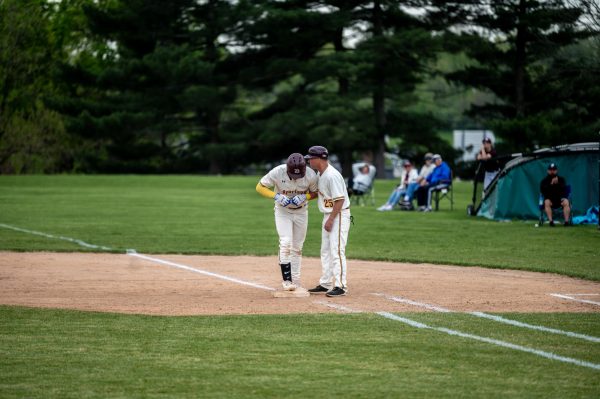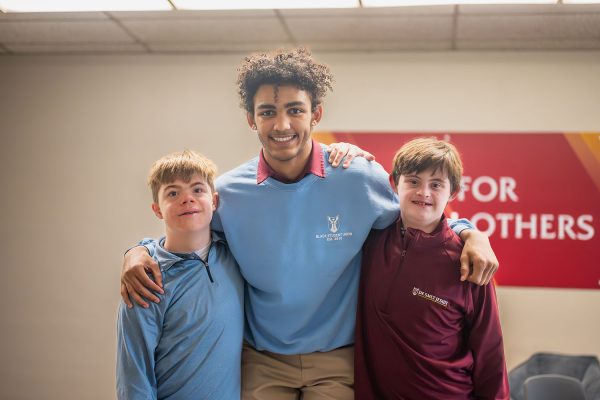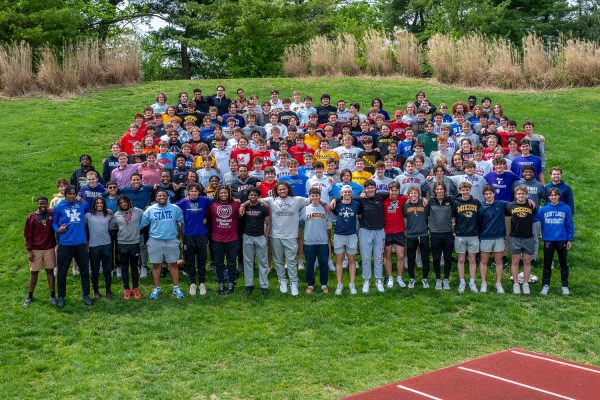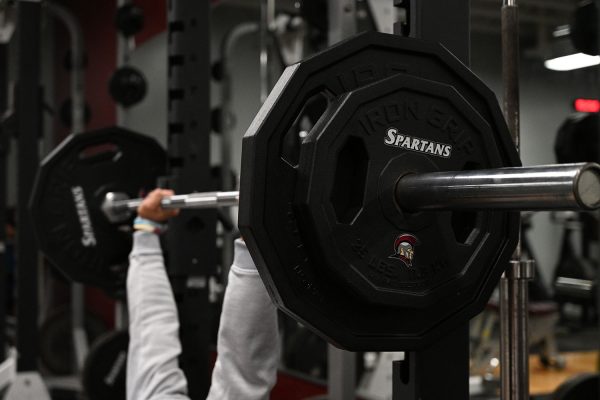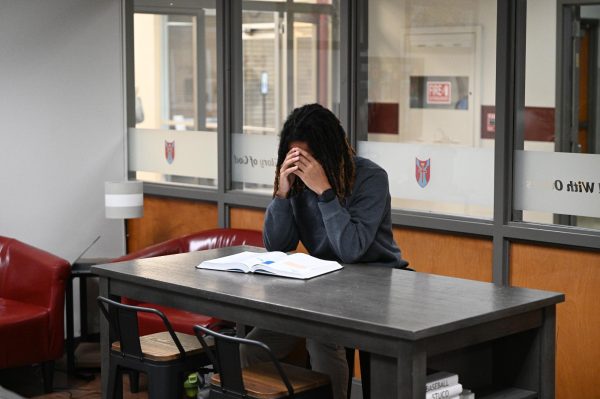Inside the Broadcast Booth with Mike Claiborne
Mike Claiborne addresses the crowd at Busch Stadium during a Cardinal game.
Baseball is finally back. The owners and players finally agreed to terms on a new Collective Bargaining Agreement, and Spring Training is officially here. With Opening Day quickly approaching, St. Louis Cardinals broadcaster Mike Claiborne is more than ready to get the season underway and get back to what he does best.
“Every time I’m involved in those sort of events, I step away…and inhale the whole moment because I don’t know if it’s ever going to happen again,” Claiborne said.
Mike Claiborne has been on the KMOX radio broadcasting team since 2006 for the St. Louis Cardinals. There, Claiborne has had the opportunity to witness a winning baseball tradition at its finest. As a broadcaster, Claiborne has many different roles from hosting pre and postgame shows to calling play-by-play during games.
“Somebody gave me the title Swiss Army Knife a couple of years ago,” Claiborne recalled. “I mean, there are a lot of things that go into it.”
A typical day as a broadcaster for Mike Claiborne consists of arriving at the ballpark in the midafternoon. He will then proceed to pregame interviews with the manager and a special guest. Claiborne will then take in batting practice, talk to team personnel to find additional information about the game.
He will then go to the broadcast booth and put his lineup card together, making sure to add any notes or statistics that he believes will be important for the game. During a meal with the other broadcasters at the ballpark, everyone exchanges information about anything that they know or want to discuss the game.
If Claiborne is not behind the microphone during the game, he will continue to keep score and try to pick up on anything in the game that could help the on-air broadcasters to incorporate it into the broadcast.
Around the seventh inning, Claiborne will begin to narrow down Player of the Game options. Around the eighth inning, he will go down to the field entrance gate and wait for the final out. If the Cardinals win, he will interview a player post-game, and then do it all again the next day. Claiborne travels continues his duties with the team during spring training and on road trips during the season.
Claiborne interacts with the players, coaches, and staff on a daily basis, building lasting relationships with countless people within the organization.
“I think that’s a Cardinal thing,” Claiborne said. I’m not sure if all managers are as close to people like me who work for the team as we are here in St. Louis, so that’s a plus for me and certainly gives me a definite advantage in being able to convey information to listeners.”
Claiborne says that the Cardinals have had some very high character people wear the Birds on the Bat and carry on the tradition of Cardinals baseball. He says that St. Louis has been very fortunate to have such a good group of players over the past 30 to 40 years, and the DeWitt family has played a key role in keeping winning baseball around.
“I interview people in their highest moment. I’ve been part of multiple celebrations in clubhouses, been on the field for them, and just the raw energy that comes with it is something that you try and file away in.”
Claiborne says that he loves all the people he works with, including radio engineer Jim Jackson, and broadcasters Ricky Horton, John Rooney, television and opposing team broadcasters, and of course, the recently retired Mike Shannon. He says that Shannon, a friend for almost 40 years, was an integral part of not only the broadcast team but what the Cardinals represent on and off the field. He says that the neat thing about St. Louis broadcasters is that everyone gets along, likes each other, and respects each other’s work. Jack Buck and Mike Shannon have carried on a tradition of being the soundtrack of Cardinal fans’ summers for generations. Claiborne says that not only in which the manner they called games, but the way they presented themselves is a gold standard of what every broadcaster should be.
“Your responsibility is not just behind a microphone, but being part of your community,” Claiborne said. “We’ve all taken that upon ourselves to follow in that tradition and being respectful to our community, being supportive of our community, and just trying to do what we can to help the next generation play it forward, as we like to say.”
Claiborne was born and raised in St. Louis, playing every sport he could throughout high school. He did “backyard play-by-play”, following teams during their highs and lows at the time with some of the best to ever call games on the airwaves.
“[I] had a chance to listen to the likes of Harry Carey and Jack Buck,” Claiborne remembers. “So you would do your own play-by-play as a kid.”
After graduating high school, Claiborne attended Tennessee State and then Fisk University in Nashville where he received a business degree. There, he landed his first gig with radio after breaking his ankle playing ball. As a writer for the school newspaper, Claiborne knew someone who worked at the local sports radio station.
“He said [that I] ought to be the color analyst for the football team; I didn’t know what color analyst was,” Claiborne said. “So I did football [and] that grew into basketball.”
Claiborne’s gig as a color analyst for college ball led him to eventually having his own 15-minute segment radio show, called Sports of all Sorts. There, he would run down the national and local sports headlines while giving his own take on games.
Claiborne has been well seasoned in regards to covering sports in St. Louis. He has done everything from St. Louis University Men’s Basketball, St. Louis Blues Hockey, sideline reporting for the St. Louis Rams, as well as covering national high school events that have taken place in St. Louis.
During the offseason, Claiborne enjoys catching up with friends and family. He participates in the Winter Warm-Up, the Cardinals Caravan, and the Cardinal School Program, creating positive environments for young people.
“I like what I do [and] I rarely admit I’ve never really worked a day in my life,” Claiborne remarked. “I’ve just shown up every day looking to have a good time. I chose this industry and it accepted me, and I’ve been blessed to be part of it; I want to keep doing that for a little while longer.”



